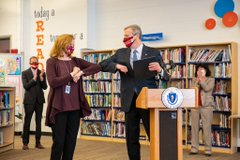Governor Baker calls for In-Person Schooling
On Tuesday Feb. 23, Governor Charlie Baker announced a plan for full-time in-person school for elementary schools in April, which will be voted upon by the state’s Board of Elementary and Secondary Education in March. While Walpole currently offers a hybrid schedule with the majority of kids in school two days a week, Baker’s plan may put more kids in school full time.
“The science is clear: Kids can safely return to classrooms, where they are best-positioned to grow + thrive,” Baker said on Twitter. “That’s why we’ve made funding, supplies + public health tools available for districts.”
Different towns have different models for learning: some having both cohorts in school the same week, others switching week by week, others being completely remote and some private schools open four days a week. Boston public schools recently welcomed students back for the first time since October. Walpole schools provide wipes and hand sanitizer for students, and has instituted a one way hallway system and contract tracing system to stop the spread of COVID-19.
“Decisions should be guided by information on school-specific factors such as mitigation strategies implemented, local needs, stakeholder input, the number of cases among students, teachers, and staff, and school experience with safely reopening,” the Center for Disease Control and Prevention (CDC) said. “A decision to remain open should involve considerations for further strengthening mitigation strategies and continuing to monitor case incidence and test positivity to reassess decisions.”
According to Mass.gov’s vaccination tracking system, 531,258 people were fully vaccinated by Feb. 28, with over a million being distributed to facilities statewide. Baker announced on March 3 that teachers are eligible to be vaccinated starting March 11.
Remote learning has been connected to numerous mental health issues including increased depression, anxiety and an overall lack of motivation. Social isolation is also harmful for students and can contribute to mental illness. For many students, socializing with peers was the most enjoyable part of school, yet COVID-19 took that away. Elementary schoolers are not only robbed of learning critical socialization skills such as sharing, but some are also forced to become literate in technology before they can even read. Elementary school is a time where a close connection with teachers is critical for the child to succeed, and if students are at home, it is much harder for teachers to reach out and help children get the support they need, whether that is in the form of extra help, emotional support or just motivation. Parents, many of whom are working, also share the burden of assisting their child in online learning.
“It is critical for schools to open as safely and as soon as possible, and remain open, to achieve the benefits of in-person learning and key support services,” the CDC said.
Additionally, evidence suggests that younger children are less susceptible to the disease. Baker’s plan is to get elementary kids in school full time, and then focus on middle and high school level kids.
“Lower incidence of COVID-19 among younger children compared to teenagers suggests that younger students (for example, elementary school students) are likely to have less risk of in-school transmission due to in-person learning than older students (middle school and high school)” the CDC said.
COVID-19 has forced school systems and teachers to be creative, and while full-time in-person school may not be at all normal, it is an improvement for thousands of children who are currently learning remotely.

Renee Abbott, class of 2021, is the Editor-in-Chief of The Searchlight. Abbott is president of Creative Writing Club, and is a choreographer for WHS Dance...








